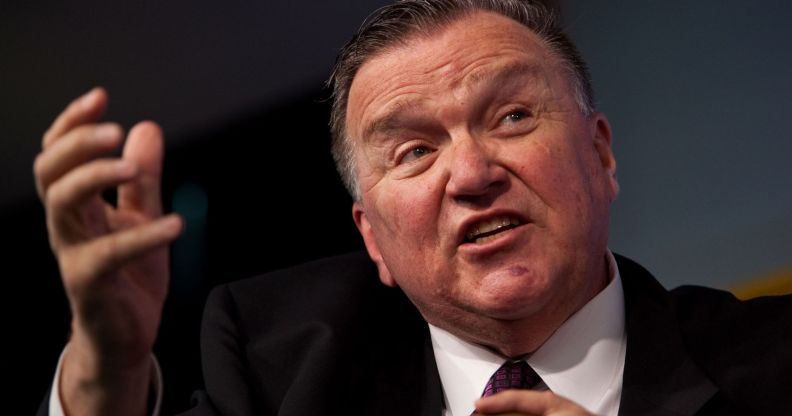‘Beloved’ LGBTQ+ activist David Mixner dies aged 77: ‘Changed the world forever’

David Mixner has died, aged 77. (Getty)
Veteran gay and civil rights campaigner David Mixner has died at the age of 77.
A friend of Mixner’s claimed the activist died following complications from long Covid, The New York Times reported.
The founder of the LGBTQ+ Victory Fund was best known for his activism in political circles around the US government, as well as for his friendship with former president Bill Clinton.
A Facebook post announced his death on Monday (11 March), saying: “It is with a heavy heart that I share the news of David’s passing today.”
Queer activist groups, not-for-profit organisations and those with whom he worked came together to call Mixner a “towering figure” of LGBTQ+ activism.
GLAAD’s chief executive, Sarah Kate Ellis, said: “David changed the world forever. Equality would not be where it is today without his leadership, passion and immense heart and humour.
“David was a beloved mentor to me and so many other LGBTQ+ leaders, always pushing for more for our community. He dedicated his life to our community, now we must strive to live up to his legacy.”
The Institute of Current World Affairs (ICWA), an organisation that enables young people to travel, study and write about LGBTQ+ issues, also issued a statement.
Trustee Fabrice Houdart told PinkNews: “He was a beacon of hope and source of inspiration for countless people battling for equal rights. His relentless efforts advancing LGBTQ+ rights and commitment to creating a more equitable world are unparalleled.”
Just last year, the ICWA dedicated a fellowship in his name.
Born in 1946 in Elmer, New Jersey, David Benjamin Mixner was the third of three of siblings. His civil rights activism began at an early age, when he used to send his pocket money to Martin Luther King Jr, who was picketing a high school in the state – a move which reportedly left his working-class parents “livid”.
He became more active in LGBTQ+ and anti-war activism during his brief time at Arizona State University. He dropped out to focus on progressive civil rights, and worked on Democrat Eugene McCarthy’s presidential campaign in 1968.
Mixner worked with a number of significant civil rights activists, including Julian Bond, who would later become the chairman of The National Association for the Advancement of Colored People.
He went on campaign for Harvey Milk, the first out gay candidate to be elected to San Francisco’s Board of Supervisors.
Over the course of his career, Mixner advocated for the end of the Vietnam War and supported the “No on Six” campaign, during which he persuaded staunch conservative Ronald Reagan, then the former governor of California, to help defeat a proposed ban on queer schoolteachers in the state.
After coming out as gay in the 1970s, Mixner became involved in HIV/Aids awareness campaigns in the 1980s.
In 1992, he arranged for Bill Clinton to make the first public address by a major presidential candidate to a gay and lesbian audience, according to The New York Times.
After Clinton became president the following year, Mixner worked to ensure the government represented queer people in its political positions. He co-founded the LGBTQ+ Victory Fund, then called the Gay and Lesbian Victory Fund, in 1991, alongside the likes of Vic Basile, Terry Bean, Roberta Bennett, David Detrick and Lynn Greer.
The not-for-profit organisation’s current president and chief executive, Annise Parker, said: “David was a courageous, resilient and unyielding force for social change at a time when our community faced widespread discrimination and an HIV/Aids crisis ignored by the political class in Washington.
“David gave his time, energy and money to building a new political reality in America, having the foresight and dedication to see it through even in the most difficult of times.”
The former mayor of Houston added: “His legacy is the thousands of out LGBTQ+ people who now serve in elected and appointed positions all across the nation, and the tens of thousands more to come.”

